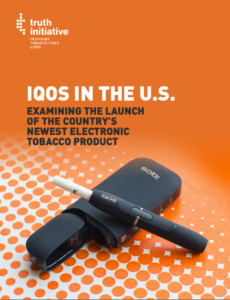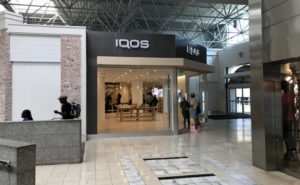Heated Tobacco Products at the Point of Sale
What are heated tobacco products?
According to the CDC, “heated tobacco products heat processed tobacco leaf, allowing users to inhale nicotine into their lungs.” They are sometimes also called “heat-not-burn” products and vary in design.
Although various heated tobacco products were introduced starting in the 1990s (e.g. RJ Reynolds’ Eclipse,” and “Revo”; Philip Morris’ “Accord”), use has remained low so far with 2.4% of adults reporting ever use of the products in 2018. However, with the introduction of newer heated tobacco products with sleek designs and the market shift to other electronic products like e-cigarettes, use may grow in coming years.
The most well-known heated tobacco product in the United States is Philip Morris International’s IQOS, authorized for sale through Altria in the U.S. by the FDA in April 2019. It consists of a rechargeable heating device that holds Marlboro-branded “HeatSticks.” When these tobacco-containing HeatSticks are inserted, a glass-covered ceramic blade from the device pierces the tobacco in order to heat it. Unlike conventional, combustible cigarettes which ignite and burn, the IQOS device heats tobacco to a much lower temperature and generates an inhalable aerosol. In design, the product aims to simulate a conventional smoking experience; tactilely, IQOS provides a similar look and feel to cigarettes, and the HeatSticks, similar to cigarettes, are sold in packs of 20 and in both menthol and non-menthol flavors. In December 2020, the next generation of these products, IQOS 3, was also authorized by the FDA for sale in the U.S. In January 2023, the FDA authorized three new versions of the HeatSticks in “Sienna,” “Bronze,” and “Amber.”
Where are they sold in the United States?
IQOS debuted in test markets in Atlanta, Georgia, and Richmond, Virginia in late 2019 and expanded to Charlotte, NC in 2020. By May 2021 they had also expanded to Buford, GA; Tysons, VA Virginia; Raleigh, NC; and Charleston and Myrtle Beach, SC. [1] While sales and imports are on hold as of November 29, 2021 due to a patent dispute with British American Tobacco, the devices were sold at at least 52 flagship stores in malls, mobile units (sometimes in parking lots of convenience stores) and kiosks, as well as pop-up stores inside convenience stores.[1, 2] HeatSticks could also be found in at least 400 additional various tobacco retailers (e.g. convenience stores, gas stations, grocery stores, and even pharmacies) as “retail partner stores” across these cities. [1, 2]
 Most of the flagship stores required individuals to be 21 years old to enter and with their high-tech and minimalist design, have been reported to have a similar feel to an Apple store. Some stores also screened customers based on their smoking status.
Most of the flagship stores required individuals to be 21 years old to enter and with their high-tech and minimalist design, have been reported to have a similar feel to an Apple store. Some stores also screened customers based on their smoking status.
According to a Truth Initiative report on “IQOS in the U.S.”, “During their visits [visitors] were told that IQOS was designed for people to switch from traditional cigarettes, that traditional smokers rather than e-cigarette users would be more likely to enjoy iQOS without the unknown risks of vaping, and that iQOS was a safer alternative to smoking – a marketing claim that iQOS was not allowed to legally make.” They also note that “Visitors to the Atlanta stores received follow-up emails promoting iQOS and announcing a rewards program for customers to exchange points for product coupons.”
Altria expects to be able to resume sales at some point in the near future. Researchers expect that the company will next target the markets in the cities of Nashville, TN; St. Louis, MN; and Louisville, KY for expansion based on market size, median household income, consumer spending, smoking prevalence, and lenient tobacco control environments.[1]
How are they regulated?
The FDA has classified heated tobacco products as cigarettes, so they are federally regulated as such. You can see how they are (or will be) regulated at the state level in this 50 state review from the Public Health Law Center. Also see their fact sheet, Heated Cigarettes: How States Can Avoid Getting Burned for more on the regulatory landscape.
However, in some places, thanks to lobbying from IQOS maker Altria, heated tobacco products are being taxed at a lower rate than cigarettes. In Virginia, where Altria is headquartered, a recent law change means that heated tobacco products are not included in the state definition of a cigarette.
How are they marketed at the point of sale?

Internationally, IQOS marketing at the point of sale has involved heavy promotional activity and prominent displays.[3] Marketing materials and promotions for the product contain themes that position it as a tool for quitting (despite the fact that they have not been scientifically shown to help smokers quit), as a healthy, and as a stylish lifestyle product. Much of Philip Morris International’s advertising campaigns for the product have also been youth oriented, as documented in a report from Stanford University.
A study assessing retail partner stores selling IQOS products in the Atlanta area between February-November 2020 found that marketing materials for IQOS products were found inside 98.5% of the stores and outside 17.3% of the stores. Displays of the products were also visible in each store.[4]
Flavors. Monitoring of these products in the retail environment will be an ongoing need. In particular, tobacco control advocates should closely watch how these products are targeted and maintain a critical eye on whether the marketing of the mentholated versions of HeatSticks (both “smooth menthol” and “fresh menthol”) is being targeted at African-American individuals and communities. The industry is notorious for their targeted marketing towards these communities, and it is yet to be seen whether they will follow down the same path for IQOS and the mentholated HeatSticks. Similarly, given the youth appeal of many of their international marketing campaigns, marketing in the US should be monitored for any youth targeting as well. IQOS products are available in menthol flavors, and research has shown that youth are most likely to initiate tobacco use with flavored products.
Cost. IQOS has a high start-up cost, with a device and pack of 200 HeatSticks selling for $80 or more, but packs of HeatSticks are sold for as low as $5.75 per pack, similar to the price of a pack of cigarettes.[5] A study assessing retail partner stores selling IQOS products in the Atlanta area between February-November 2020 found that the average price per pack of HeatSticks was $6.40, slightly higher than the price of a pack of Marlboro Red cigarettes ($6.08).[4] In addition, IQOS offers discounts for referrals and rewards programs.[2] At the retail partner stores assessed in the Atlanta, GA area, one third of stores sold HeatSticks with a multipack discount.[4]
Sampling. In flagship stores, adult customers who say that they currently smoke can test out a trial version of the product for $1.00.[2]
Modified exposure claims: In July 2020, the FDA authorized Philip Morris to market its IQOS Tobacco Heating System as a ‘modified risk tobacco product’, making the IQOS device and its accompanying HeatSticks only the second set of products to be authorized as modified risk tobacco products and the first tobacco products to receive “exposure modification” orders. With this authorization, Philip Morris can now market claims that the IQOS system “heats tobacco but does not burn it” and that completely switching to the product from cigarettes “significantly reduces the production of harmful and potentially harmful chemicals”; they can also advertise that “scientific studies have shown that switching completely from conventional cigarettes to the IQOS system significantly reduces your body’s exposure to harmful or potentially harmful products.” Whether these products are truly safer than cigarettes remains questionable, with more research needed on both the short- and long-term effects on morbidity and mortality. In 2018 FDA Tobacco Product Scientific Advisory Committee found that the IQOS did not substantially reduce risks of tobacco-related death and disease, and in 2019, FDA did not approve the products for a “risk modification” label.
Even with authorization of the modified risk claim, the FDA maintains that the products are neither safe nor FDA-approved. The nicotine in the product is highly addictive, and independent, peer-reviewed research assessing the short- and long-term effects of these products is severely lacking. As well, a significant portion of the current research has been led, funded by, or in some way associated with the tobacco industry. As a result, the authorization requires both the FDA and Philip Morris to continue to monitor the appropriateness of the modified risk order and its impact on youth use. In response to the FDA authorization, multiple organizations, including the Campaign for Tobacco-Free Kids, American Cancer Society Cancer Action Network, American Heart Association, American Lung Association and Truth Initiative, issued a joint counterstatement, arguing the authorization puts youth and the public’s health at risk. Their concerns center on Philip Morris International’s marketing of IQOS as a safe, sleek, and stylish product, in a similar way that e-cigarettes were marketed, and concerns that this will lead to non-smokers and youth, in particular, being enticed by the advertising and initiating tobacco use.
Learn more about the tobacco industry’s use of “harm reduction” claims (despite limited evidence) as a marketing tactic in the Public Health Law Center’s resource A Dearth of Data: E-Cigs & Heated Tobacco Products and learn more specifically about the implications of IQOS’s modified exposure marketing authorization in this FAQ fact sheet from the Public Health Law Center: IQOS is a “Modified Risk Tobacco Product” – So What?
Nicotine levels: Research and a report from the Bureau of Investigative Journalism found that while Philip Morris International has marketed it’s heated tobacco sticks as containing 0.5mg of nicotine per stick, they actually contained 4mg, more than eight times the amount the company claimed. Advertising a lower level of nicotine may also affect consumer perceptions regarding reduced harm and lead consumers to think the products are less addictive than they actually are.
Next steps
It is imperative that the FDA and other independent researchers not only continue to assess the risk of harm of these products but also routinely assess how these products are being marketed and sold; as this new modified risk claim will likely impact perceptions of harm, there is a critical need to keep a finger on the pulse of how the marketing of this product affects use, especially among youth who research indicates may misunderstand reduced exposure claims.[5]
It is also important that new tobacco control policy language is inclusive of heated tobacco products and that already established ordinances and polices are amended to include them if existing definitions are not comprehensive enough to do so already. This includes licensing ordinances so that jurisdictions can keep track of where heated tobacco products are being sold, ensure they are not being sold to underage youth, and implement other restrictions on the sale and marketing of the products as appropriate.
Learn more in our podcast episode on Heated Tobacco Products! Listen below or on iTunes, Spotify, iHeartRadio, or LibSyn.
(Photo from TruthInitiative.org)
Transcript for the episode can be found here.
Additional Resources
- CDC’s page on Heated Tobacco Products
- Public Health Law Center’s Heated Cigarette Regulations – 50 State Review and factsheet “Heated Cigarettes: How States Can Avoid Getting Burned”
- Global Marketing of IQOS: The Philip Morris Campaign to Popularize “Heat Not Burn” Tobacco, Stanford Research into the Impact of Tobacco Advertising
- WHO’s Heated tobacco products: a brief (2020) and Heated Tobacco Products Information Sheet (2ndedition)
- Campaign for Tobacco Free Kids’ Heated Tobacco Products
- UCSF Smoking Cessation Leadership Center’s recorded webinar: Unboxing iQOS: History, risk perceptions, and clinical implications


